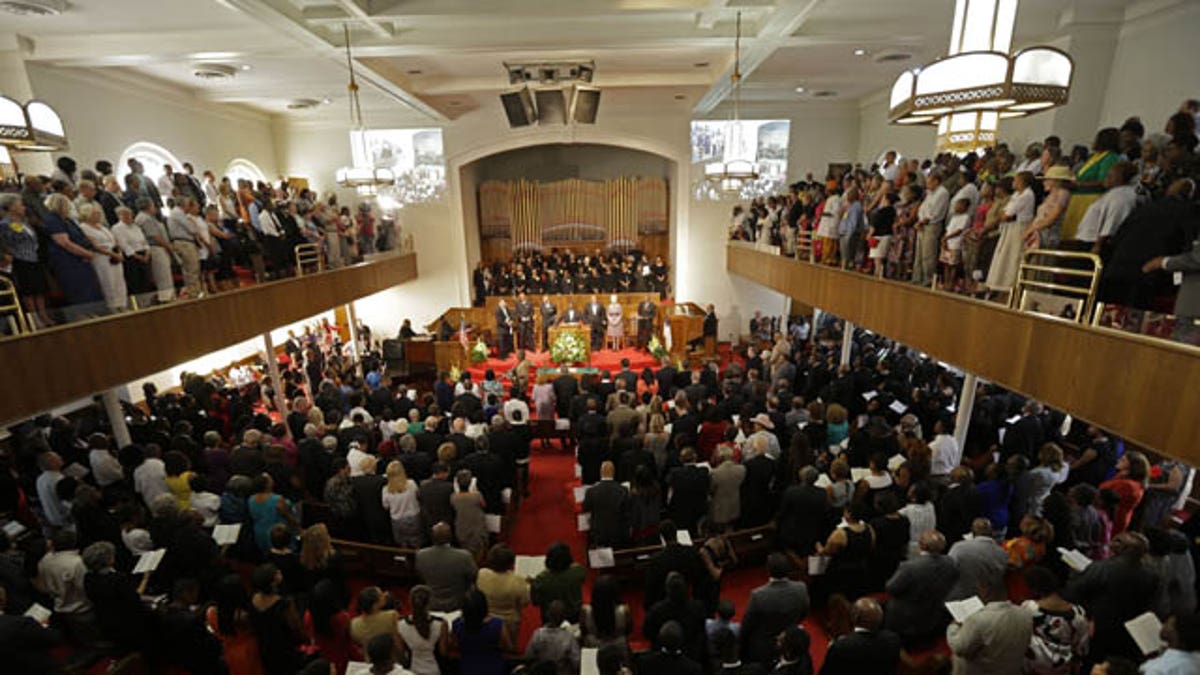
September 15, 2013: The congregation sings at the 16th Street Baptist Church in Birmingham, Ala. The church held a ceremony honoring the memory of the four young girls who were killed by a bomb placed outside the church 50 years ago by members of the Ku Klux Klan. (AP Photo)
Hundreds of people black and white, many holding hands, filled an Alabama church that was bombed by the Ku Klux Klan 50 years ago Sunday to mark the anniversary of the blast that killed four little girls and became a landmark moment in the civil rights struggle.
The Rev. Arthur Price taught the same Sunday school lesson that members of 16th Street Baptist Church heard the morning of the bombing -- "A Love That Forgives." Then, the rusty old church bell was tolled four times as the girls' names were read.
Bombing survivor Sarah Collins Rudolph, who lost her right eye and sister Addie Mae Collins in the blast, stood by as members laid a wreath at the spot where the dynamite device was placed along an outside wall.
Rudolph was 12 at the time, and her family left the church after the bombing. She said it was important to return in memory of her sister, who was 14, and the three other girls who died: Carole Robertson and Cynthia Wesley Morris, both 14, and Denise McNair, 11.
"God spared me to live and tell just what happened on that day," said Rudolph, who testified against the Klansmen convicted years later in the bombing.
Congregation members and visitors sang the old hymn "Love Lifted Me" and joined hands in prayer. The somber Sunday school lesson was followed by a raucous, packed worship service with gospel music and believers waving their hands.
During the sermon, the Rev. Julius Scruggs of Huntsville, president of the National Baptist Convention USA, said, "God said you may murder four little girls, but you won't murder the dream of justice and liberty for all."
Later Sunday, attendees of an afternoon commemoration included Attorney General Eric Holder, Alabama Gov. Robert Bentley, former U.N. Ambassador Andrew Young, Jesse Jackson, Rev. Joseph Lowery and director Spike Lee, who made a documentary about the bombing.
The church was full, with the only surviving mother of one of the girls, Maxine McNair, sitting in the front row.
Holder called the girls' deaths "a seminal and tragic moment" in U.S. history and recalled gains that followed their killings like the Civil Rights Act and the Voting Rights Act.
Alluding to the Supreme Court decision this year that struck down a key part of the voting law, Holder said the struggle continues decades later.
"This a fight that we will continue," Holder said.
The dynamite bomb went off outside the church Sept. 15, 1963. Of the Klansmen convicted years later, one remains imprisoned. Two others died in prison.
Two young men, both black, were shot to death in Birmingham in the chaos that followed the bombing.
Birmingham was strictly segregated at the time of the bombing, which occurred as city schools were being racially integrated for the first time. The all-black 16th Street Baptist was a gathering spot for civil rights demonstrations for months before the blast.
The bombing became a powerful symbol of the depth of racial hatred in the South and helped build momentum for later laws, including the 1964 Civil Rights Act and the Voting Rights Act of 1965.
During the morning commemoration, an honor guard composed of black and whites officers and firefighters watched over ceremonies with mixed-race crowd, something that would have been unthinkable in Birmingham in 1963. That same year, white police officers and firefighters used dogs and water hoses on black demonstrators marching for equal rights.
President Barack Obama issued a statement noting that earlier this year the four girls were posthumously awarded the Congressional Gold Medal, one of the country's highest civilian honors.
"That horrific day in Birmingham, Alabama quickly became a defining moment for the Civil Rights Movement. It galvanized Americans all across the country to stand up for equality and broadened support for a movement that would eventually lead to the passage of the Civil Rights Act of 1964," Obama said.
Rev. Bernice King, a daughter of the late Rev. Martin Luther King Jr., noted the changed city in a prayer.
"We thank you father for the tremendous progress we have made in 50 years, that we can sit in the safe confines of this sanctuary being protected by the city of Birmingham when 50 years ago the city turned its eye and its ears away from us," she said.








































